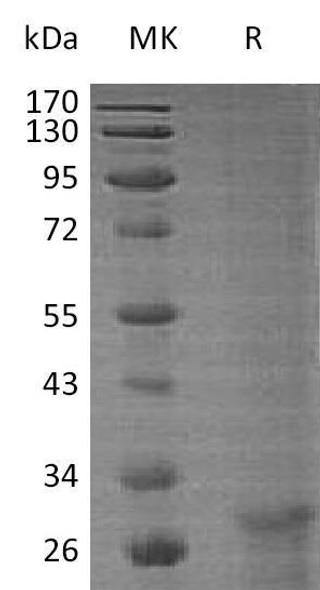Description
| Product Name: | Human KLF6 Recombinant Protein |
| Product Code: | RPPB3796 |
| Size: | 10µg |
| Species: | Human |
| Target: | KLF6 |
| Synonyms: | Krueppel-like factor 6, B-cell-derived protein 1, Core promoter element-binding protein, GC-rich sites-binding factor GBF, Proto-oncogene BCD1, Suppressor of tumorigenicity 12 protein, Transcription factor Zf9, KLF6, BCD1, COPEB, CPBP, ST12. |
| Source: | Escherichia Coli |
| Physical Appearance: | Sterile Filtered clear solution. |
| Formulation: | The KLF6 solution (1mg/ml) contains 20mM Tris-HCl buffer (pH8.0), 10% glycerol and 1mM DTT. |
| Stability: | Store at 4°C if entire vial will be used within 2-4 weeks. Store frozen at -20°C for longer periods of time. For long term storage it is recommended to add a carrier protein (0.1% HSA or BSA).Avoid multiple freeze-thaw cycles. |
| Purity: | Greater than 85% as determined by SDS-PAGE. |
| Amino Acid Sequence: | MGSSHHHHHH SSGLVPRGSH MGSMDVLPMC SIFQELQIVH ETGYFSALPS LEEYWQQTCL ELERYLQSEP CYVSASEIKF DSQEDLWTKI ILAREKKEES ELKISSSPPE DTLISPSFCY NLETNSLNSD VSSESSDSSE ELSPTAKFTS DPIGEVLVSS GKLSSSVTST PPSSPELSRE PSQLWGCVPG ELPSPGKVRS GTSGKPGDKG NGDASPDGRR RVHRCHFNGC RKVYTKSSHL KAHQRTHTGE KPYRCSWEGC EWRFARSDEL TRHFRKHTGA KPFKCSHCDR CFSRSDHLAL HMKRHL |
Kruppel-Like Factor 6 (KLF6) is a nuclear protein which has 3 zinc fingers. The zinc fingers of KLF6 are accountable for the specific DNA binding with the guanine-rich core promoter factors. The central region is involved in activation or posttranslational regulatory pathways, and the acidic N terminal domain takes part in the process of transcriptional activation.
KLF6 Human Recombinant produced in E. coli is. a single polypeptide chain containing 306 amino acids (1-283) and having a molecular mass of 34.3kDa. KLF6 is fused to a 23 amino acid His-tag at N-terminus & purified by proprietary chromatographic techniques.
| UniProt Protein Function: | KLF6: Transcriptional activator. Binds a GC box motif. Could play a role in B-cell growth and development. Defects in KLF6 are a cause of gastric cancer (GASC); also called gastric cancer intestinal or stomach cancer. Gastric cancer is a malignant disease which starts in the stomach, can spread to the esophagus or the small intestine, and can extend through the stomach wall to nearby lymph nodes and organs. It also can metastasize to other parts of the body. The term gastric cancer or gastric carcinoma refers to adenocarcinoma of the stomach that accounts for most of all gastric malignant tumors. Two main histologic types are recognized, diffuse type and intestinal type carcinomas. Diffuse tumors are poorly differentiated infiltrating lesions, resulting in thickening of the stomach. In contrast, intestinal tumors are usually exophytic, often ulcerating, and associated with intestinal metaplasia of the stomach, most often observed in sporadic disease. Defects in KLF6 are a cause of prostate cancer (PC). Prostate cancer is a malignancy originating in tissues of the prostate. Most prostate cancers are adenocarcinomas that develop in the acini of the prostatic ducts. Other rare histopathologic types of prostate cancer that occur in approximately 5% of patients include small cell carcinoma, mucinous carcinoma, prostatic ductal carcinoma, transitional cell carcinoma, squamous cell carcinoma, basal cell carcinoma, adenoid cystic carcinoma (basaloid), signet-ring cell carcinoma and neuroendocrine carcinoma. Belongs to the krueppel C2H2-type zinc-finger protein family. 2 isoforms of the human protein are produced by alternative splicing. |
| UniProt Protein Details: | Protein type:DNA-binding; C2H2-type zinc finger protein Chromosomal Location of Human Ortholog: 10p15 Cellular Component: nucleus Molecular Function:protein binding Biological Process: positive regulation of transcription, DNA-dependent Disease: Gastric Cancer; Prostate Cancer |
| NCBI Summary: | This gene encodes a member of the Kruppel-like family of transcription factors. The zinc finger protein is a transcriptional activator, and functions as a tumor suppressor. Multiple transcript variants encoding different isoforms have been found for this gene, some of which are implicated in carcinogenesis. [provided by RefSeq, May 2009] |
| UniProt Code: | Q99612 |
| NCBI GenInfo Identifier: | 7387592 |
| NCBI Gene ID: | 1316 |
| NCBI Accession: | Q99612.3 |
| UniProt Secondary Accession: | Q99612,Q5VUT7, Q5VUT8, Q9BT79, B2RE86, B4DDN0, D3DRR1 F5H3M5, |
| UniProt Related Accession: | Q99612 |
| Molecular Weight: | 26,110 Da |
| NCBI Full Name: | Krueppel-like factor 6 |
| NCBI Synonym Full Names: | Kruppel like factor 6 |
| NCBI Official Symbol: | KLF6�� |
| NCBI Official Synonym Symbols: | GBF; ZF9; BCD1; CBA1; CPBP; PAC1; ST12; COPEB�� |
| NCBI Protein Information: | Krueppel-like factor 6 |
| UniProt Protein Name: | Krueppel-like factor 6 |
| UniProt Synonym Protein Names: | B-cell-derived protein 1; Core promoter element-binding protein; GC-rich sites-binding factor GBF; Proto-oncogene BCD1; Suppressor of tumorigenicity 12 protein; Transcription factor Zf9 |
| Protein Family: | Krueppel-like factor |
| UniProt Gene Name: | KLF6�� |
| UniProt Entry Name: | KLF6_HUMAN |






